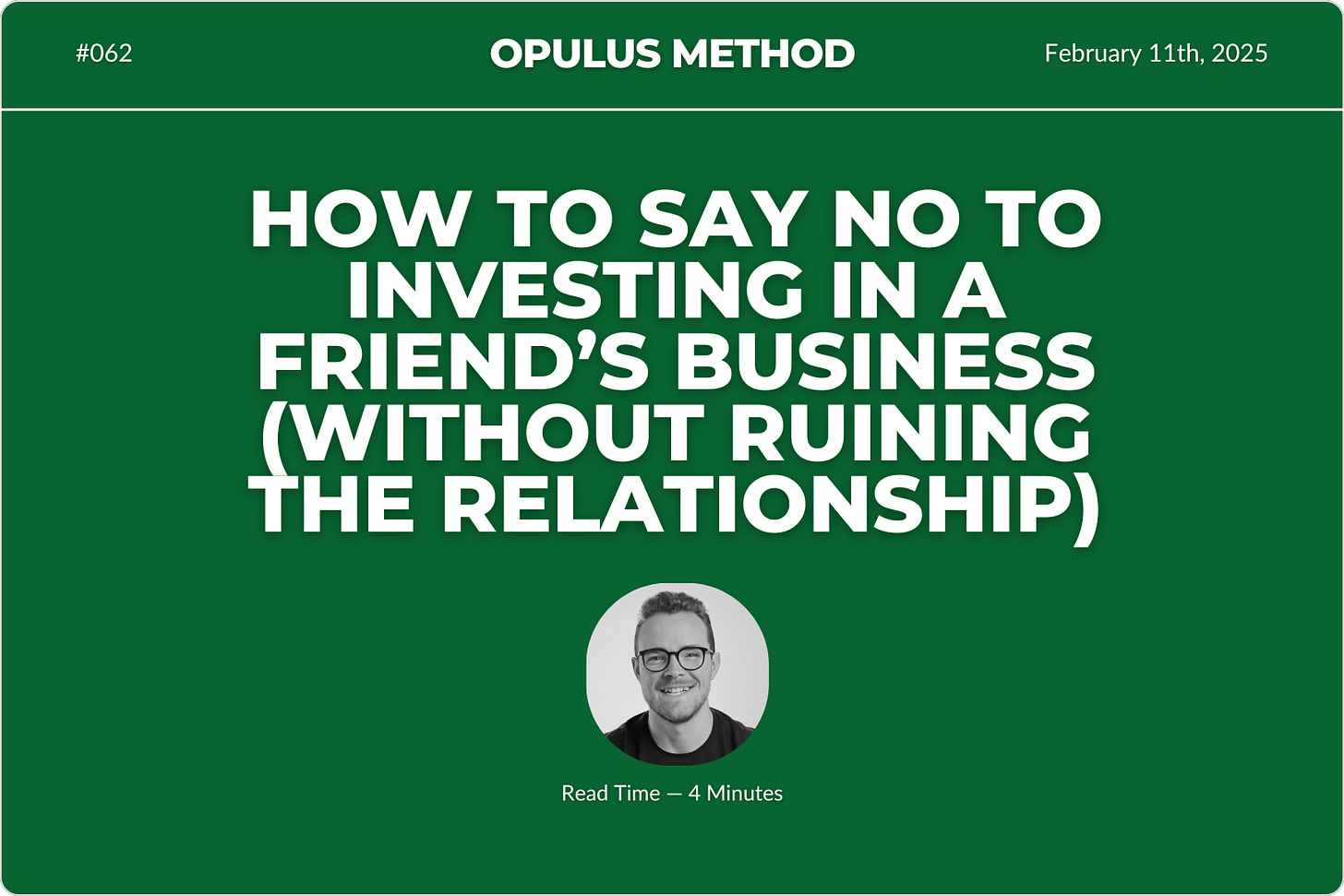How to Say No to Investing in a Friend’s Business (Without Ruining the Relationship)
Smart Ways to Protect Your Finances While Still Offering Support
Investing in a private business can be exciting—especially when it’s pitched by a close friend or family member. But enthusiasm doesn’t equal a solid investment, and saying “yes” without due diligence can lead to financial loss, strained relationships, and regret.
Whether it’s a cousin with a “guaranteed” coffee shop concept or a friend who’s convinced they’ve built the next Amazon, knowing how to navigate these conversations is essential.
Here’s what we’ll cover today:
The biggest risks of investing in private businesses
Key questions to ask before investing
A framework for saying no (without guilt)
Alternative ways to support friends and family without writing a check
Let’s dive in.
The Risks of Investing in Friends & Family’s Business Ideas
It’s easy to get swept up in a loved one’s enthusiasm. They believe in their idea, they’ve put in effort, and they want you to believe in it too. But before you agree, consider these common risks:
The Relationship Fallout – If the business fails (and many do), will resentment build? Will they feel betrayed if you say no?
No Due Diligence – Personal connections can make it feel unnecessary to check the numbers, but a great idea without execution is just a dream.
Lack of Liquidity – Unlike stocks, bonds, or real estate, private business investments are illiquid. If you need that money back, you may not get it.
The Precedent Problem – Saying yes once could set the expectation that you’ll keep funding future ventures.
If you wouldn’t invest in a stranger’s business under the same circumstances, why invest in a friend’s?
Key Questions to Ask Before Investing
Before committing a dollar, ask yourself (and them) these questions:
Do they have a detailed business plan? If they can’t clearly explain their market, costs, and revenue model, that’s a red flag.
Have they invested their own money first? If they don’t have skin in the game, why should you?
What’s their track record? Have they successfully started or managed a business before? I always joke that everyone who loves lifting weights thinks they could run a great gym, obviously not the case!
Can you afford to lose 100% of this investment? If the answer is no, reconsider.
If any of these questions raise doubts, it’s a sign to proceed with extreme caution.
How to Say No (Without Guilt or Awkwardness)
Rejecting an investment request doesn’t mean you don’t support them—it just means you’re making a responsible financial decision. Here’s how to turn them down gracefully:
Be Direct & Honest:
“I value our relationship, but I’m not in a position to invest.”
“I need to prioritize my own financial goals right now.”
Avoid Making It Personal:
Focus on your financial strategy, not their business idea.
Offer Encouragement:
“I think it’s great that you’re going after this, and I want to see you succeed, and will help in any other way that I can.”
A firm but kind response prevents misunderstandings while preserving the relationship.
Alternative Ways to Offer Support (Without Investing)
Just because you’re not writing a check doesn’t mean you can’t help. Consider these options:
Give Constructive Feedback – Offer to review their business plan and provide honest insights.
Connect Them to Your Network – Introduce them to people who might offer guidance, mentorship, or other funding sources.
Share Funding Resources – SBA loans, grants, or crowdfunding might be a better fit than personal investment.
By supporting them in non-financial ways, you’re still showing you care—without risking your own financial security.
Key Takeaways
Not every business pitch from a friend or family member is a good investment.
Asking the right questions helps you separate solid opportunities from high-risk bets.
It’s okay to say no while still offering guidance and support.
Protecting your own financial future should always come first.
At the end of the day, saying no to a risky investment doesn’t make you selfish—it makes you responsible.
PS: Know someone struggling with this exact scenario? Forward this newsletter their way!
Whenever you're ready, there are 2 other ways we can help you:
Opulus Method Digital Course: Join 350+ students inside the Opulus Method. In just 90 minutes, learn a proven system to secure your financial freedom without sacrificing your lifestyle.
Join Opulus as a Client: We'll build your personalized strategy to reduce taxes, boost your income, and grow your wealth. Live life on your terms—we'll execute the financial strategy to get you there.
Opulus, LLC (“Opulus”) is a registered investment advisor in Pennsylvania and other jurisdictions where exempted. Registration as an investment advisor does not imply any specific level of skill or training.
The content of this newsletter is for informational purposes only and does not constitute financial, tax, legal, or accounting advice. It is not an offer or solicitation to buy or sell any securities or investments, nor does it endorse any specific company, security, or investment strategy. Readers should not rely on this content as the sole basis for any investment or financial decisions.
Past performance is not indicative of future results. Investing involves risks, including the potential loss of principal. There is no guarantee that any investment strategies discussed will result in profits or avoid losses.
All information is provided "as-is" without any warranties, express or implied. Opulus does not warrant the accuracy, completeness, or reliability of the information presented. Opinions expressed are those of the authors, Ryan Greiser and Francis Walsh, and are subject to change without notice.
Opulus is not responsible for any errors or omissions, nor for any direct, indirect, or consequential damages resulting from the use or reliance on this information. Use of the content is at your own risk. This content is not intended as an offer or solicitation in any jurisdiction where such an offer or solicitation would be illegal.




